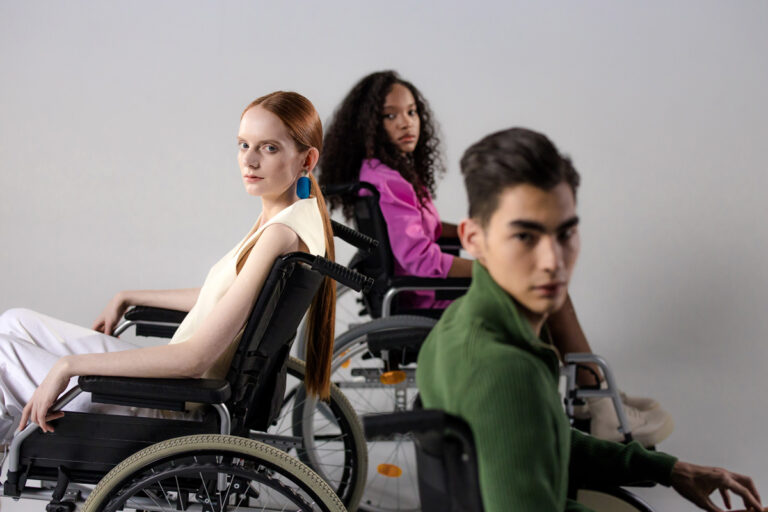Ableist airports: what it’s like travelling as a disabled person amid shortage chaos
Though the summer season is in full swing for many, the joys of travelling to a new place for a well-needed break have remained a stressful feat, even after two years of being locked up inside. The COVID-19 pandemic continues to cause complications to trips—with the knock-on impacts of staff shortages and missing suitcases that make getting to your destination in one piece quite a task.
If you’ve had the misfortune of breaking a leg on a girls’ trip to Ibiza, or travelled with older members of your family, you may have experienced what the travel industry (condescendingly) calls ‘special assistance’.
Special assistance is the service airports and airlines provide to disabled, elderly or injured people, to ensure they can transit safely. In theory, it is a simple self-registration system that a traveller can use, alerting the airline at the time of booking what their access needs will be on the day of travel. However, it rarely goes to plan. Invasive questions, last-minute changes, being left in hallways or forgotten about on a plane—it is more often than not a reminder that your disabled body is an inconvenience, nothing more.
In April 2022, I flew home from Luton airport, just as the news began to spread about the industry’s staff shortages. A last-minute gate change and no assistance worker who knew an accessible route to the plane left me sliding down three sets of stairs on my bum as a last resort to reach the entrance of the gate. I was lucky, I have working use of my legs, and I could find a way to the plane.
For other members of the disabled community, there would have been no options at all. It is not only the act of doing such a thing—having people stop and stare—that feels humiliating, but the internal battle of feeling like you, the disabled person, are a burden.
By the time the transit team loaded me into the plane, I was sobbing. I had delayed the flight, people glared as I got into my seat and an overwhelming feeling of grossness came over me. I felt dirty, from sliding across airport stairs but also for causing a fuss, hatred for my body that didn’t work like everyone else’s. This is internalised ableism, my mind absorbing the idea that society perpetuates: disabled people are less than, a nuisance, a waste of space.
This year in particular, the ‘summer of chaos’ as the tabloids are calling it, causes extra anxiety for those of us travelling with chronic health conditions. Amber, who suffered similar grievances, spoke to SCREENSHOT about her recent experience travelling home from a holiday. “The airline told us it was a three-hour delay, but when we arrived to board, the flight had been cancelled. I had already spent three days of my holiday in hospital with illness complications.”
Amber’s flight was due to take off in the early hours of the morning, and she had slept on an airport chair waiting for the new flight time. “I can become very ill when I sleep so it wasn’t ideal, then when the cancellation was announced, all of the airline staff left, and there was no one to help,” she added.
Sure, these types of unplanned changes can cause havoc to all travellers, but more so, they respectively place chronically ill travellers in a very specific kind of danger. Inability to access mobility aids, being forced to sit or stand in positions that increase chronic pain and the likelihood of arranged special assistance being lost or not properly communicated are a few of the many ways that an airport experience this summer can be anything but smooth sailing.
Even prior to this disruptive travel season, travelling from one country to another has always been a struggle if you’re disabled. An American disabled activist Engracia Figueroa died last year while being forced to wait five hours in an airport wheelchair upon discovering her own chair had been broken in transit.
Custom wheelchairs can cost tens of thousands of pounds, and are made to accommodate the specific person who is using them. Your chair travels in the storage area of the plane, and the likelihood of damage is high. Figueroa developed a pressure sore from the airport chair which became infected and led to her death.
Lauren, another disabled young person living in the US, spoke to SCREENSHOT and expressed her constant worry while travelling with her chair: “If my wheelchair dies, then my legs are broken but every one of my friends who uses a wheelchair has experienced damage during a trip to a piece of equipment.” Society still has a narrow view of disability, a middle-aged white man who has experienced traumatic injury is the only wheelchair user we know or even respect. Lauren confirmed this by stating that while travelling alone as a young woman, “of course I am taken less seriously.”
A multifaceted approach to disability is required if we are to improve the way disabled and chronically ill travellers are treated on their journeys. We need accountability from airlines that damage people’s lifeline equipment, we need better-trained staff and for them to be adequately paid to avoid industry shortages. There must also be an understanding from other passengers that disabled travellers are not the cause of the delays or hold-ups—it is (as it always is) a failing system that lets us all down.





